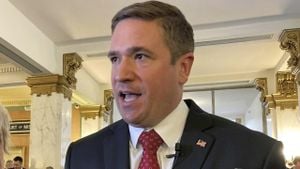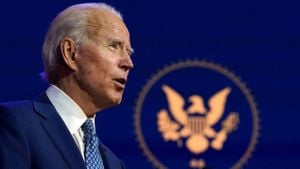On the anniversary of Russia’s full-scale invasion of Ukraine, alarming revelations from Anton, a former officer of the Russian nuclear forces, have surfaced, indicating the sheer readiness of Moscow’s nuclear arsenal. Speaking from a confidential location outside Russia, Anton disclosed how the nuclear weapons base where he served was placed on full combat alert on February 24, 2022, the moment Russian troops crossed the Ukrainian border.
“Before the war started, we only conducted exercises,” Anton recounted. “But on the day the war began, the weapons were fully operational and we were primed to launch forces both to the sea and air. It was chilling to know we were theoretically prepared to carry out nuclear strikes.” The former officer, using a pseudonym for his safety, is one of the few insiders willing to disclose the deeply secretive operations within Russia’s nuclear military sector. His accounts illuminate the readiness to deploy these weapons from day one of the war, contradicting some perceptions of hesitance within the Russian command.
Just three days after the invasion began, President Vladimir Putin announced the nuclear deterrence forces were entering what he called a “special mode of combat service.” While the Kremlin often refers to this alert as just part of military protocol, Anton’s experience suggests it was met with seriousness—his unit was routinely trained for such high-stakes moments, having established rapid-response protocols.
“Our reaction time was two minutes,” he confidently asserted, underscoring the gravity of their responsibilities. Anton emphasized the strict recruitment process at these nuclear facilities, where only experienced professional soldiers serve. “There are no conscripts among us. It's all about constant checks, including regular lie-detector tests,” he explained, painting the picture of relentless discipline governing life at the base.
What makes Anton's tribunal particularly gripping is the cultural backdrop of secrecy. He detailed how closed-off the society was within these military installations. “We had to submit requests three months prior for our families to visit,” he mentioned, indicating how heavily monitored their lives were. Contact with the outside world was limited, with strict prohibitions against using personal phones on-site, starkly illustrating the isolation inherent to their positions.
Regarding the broader concerns surrounding nuclear arms, the Federation of American Scientists estimates Russia has around 4,380 operational nuclear warheads, significantly more than NATO's collective stock. Only about 1,700 of these warheads are deemed “deployed” or immediately available for use. The prospect of deploying tactical nuclear weapons—smaller, less catastrophic options—remains unsettling, raising the stakes should the conflict deepen.
Analyzing Putin's nuclear doctrine, Anton highlighted recent adjustments made as confirmation of Moscow's shifting military strategy. Recently, the doctrine was amended to allow for nuclear responses if Russia is under massive attack from conventional forces supported by nuclear states. This marks a stark change from previous policies where such measures were more tightly controlled. This broader trigger for nuclear engagement has rattled both military analysts and international observers alike, who are wary of the potential for miscalculation.
Despite these grim assessments, Anton also defended the functional state of Russia's nuclear arsenal against Western experts who claim it comprises mostly outdated systems. “While there may be some older weapons, the arsenal remains enormous, and maintenance is constant,” he maintained confidently. “They’re not merely trash from the Soviet era; they're kept ready for use at all times.”
The internal strife faced by Anton eventually led him to flee the country with help from volunteer organizations assisting deserters. Shortly after the invasion, he was issued what he described as “criminal orders” to promote the narrative of viewing Ukrainian civilians as combatants who must be eliminated—an order he ardently resisted.
“That was my red line; I refuse to promote such propaganda,” he stated, advocating against what he described as war crimes being propagated within the ranks. Following his refusal, he was reassigned to lesser divisions known for being the first waves sent to the front lines, where dissenters are often viewed as liabilities.
Eventually, Anton was faced with dire consequences for his stance. A criminal case was opened against him, labeling him as insurgent due to his refusal to participate in aggressive actions. Fearing retribution, he decided to escape, aided by the organization known as 'Idite Lesom'—which translates to 'Go by the Forest' or 'Get Lost.' Understandably, his escape was fraught with difficulty and danger, with regular reports of deserters who have faced violent reprisals upon capture.
Even now, Anton remains cautious, aware of the relentless hunt by security services for deserters. “I take precautions, work off the books, and keep my existence as untraceable as possible,” he revealed, reiteratively cautious of how even innocuous communication might endanger colleagues still serving at the nuclear base. “My friends at the base must take lie detector tests, so even accidental contact with me could lead to severe consequences for them.”
Despite the constant threat to his safety, Anton feels compelled to speak out, emphasizing how many Russian soldiers oppose the war. “Fear is palpable among troops—many do not agree with the aggression forced upon them,” he insisted, encapsulating the mixed feelings within the ranks.
Anton remains resolute about his mission to inform the world, stating, “The risk has only escalated the more involved I get with helping others escape,” adding gravitas to the sacrifices he makes for his cause. “But I firmly believe it’s worth it; the world should know the truth.”
His testimony highlights the broader humanitarian concerns entwined with the geopolitical chess game of nuclear preparedness, prompting pressing questions about the integrity of military morals amid omnipresent threats.



